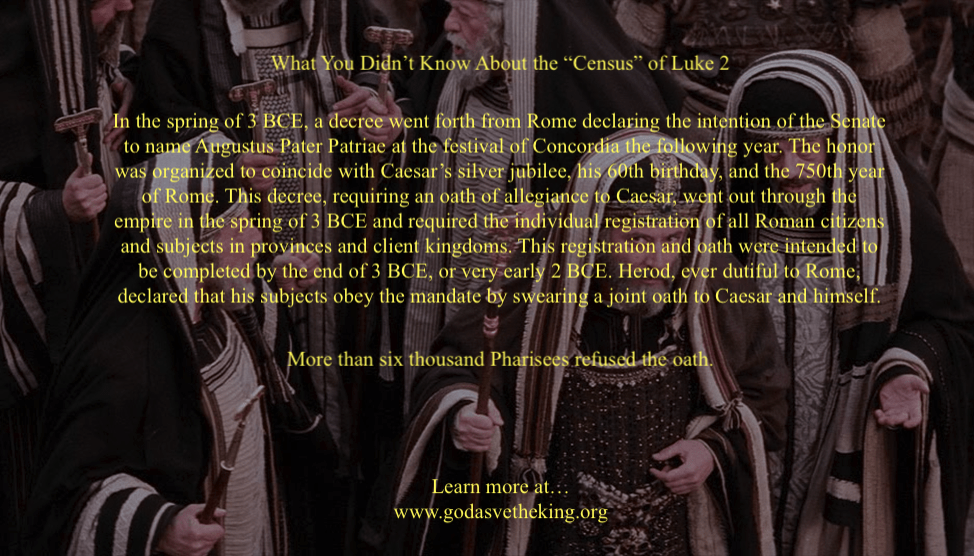(1) And it came to pass in those days {that} a decree went out from Caesar Augustus that all the world should be registered. (2) This census first took place while Quirinius was governing Syria. (3) So, all went to be registered, everyone to his own city.
Luke 2:1–3 NKJV

About two and one-half years before Herod died, the internal power structure of his kingdom was shifting. Palace intrigue had plagued his household for many years—ever since his two sons by Mariamne I—Alexander and Aristobulus had returned from their education in Rome about fourteen years earlier. Herod had recently executed both on charges of sedition and plotting to kill him. Their deaths left Antipater, his eldest son by his first wife Doris, his declared sole heir and successor to the throne. Court intrigue continued, however. Although his other sons were too young for immediate consideration as heirs, each had mothers, aunts, uncles, and other interested parties who strategized in anticipation of future claims.
The Pharisees played an unexpected role in these internal affairs. In the spring of 3 BCE, a decree went forth from Rome declaring the intention of the Senate to name Augustus Pater Patriae at the festival of Concordia the following year. The honor was organized to coincide with Caesar’s silver jubilee, his 60th birthday, and the 750th year of Rome. This decree, requiring an oath of allegiance to Caesar, went out through the empire in the spring of 3 BCE and required the individual registration of all Roman citizens and subjects in provinces and client kingdoms. This registration and oath were intended to be completed by the end of 3 BCE, or very early 2 BCE. Herod, ever dutiful to Rome, declared that his subjects obey the mandate by swearing a joint oath to Caesar and himself.
Although the Romans were experts at taxation and censuses, a census was an expensive and inconvenient undertaking. Accordingly, they were only conducted several years apart, and only when there was absolute need, and then, administrated at the provincial level. In anticipation and preparation for these events, the common Roman practice was ordering and maintaining city registers—the name and residential location of each person living in a city or surrounding rural area would be recorded. These records were used to certify residency, which would then be used not only for local or national taxes, but when a non-local taxation or census would occur. City governments would total the local population and then report this total to national or provincial authorities. (Given this understanding, it is now evident that Joseph and Mary were relocating to Bethlehem, not merely going there to register and then return to Nazareth.)
Although neither a tax nor a census, the decree from Rome took advantage of this established practice. Herod ordered his subjects to swear a joint oath of loyalty to Augustus and himself.
On a previous occasion many years earlier, Herod had excused the Pharisees from an oath to himself in return for a promise of mutual non-interference. This occasion, however, about fourteen years later, was a much more serious situation. Refusal to swear allegiance to himself was one thing—refusal to swear allegiance to Caesar was something altogether different.
More than six thousand Pharisees refused the oath.1
- Josephus, Antiquities of the Jews, 17.2.4.